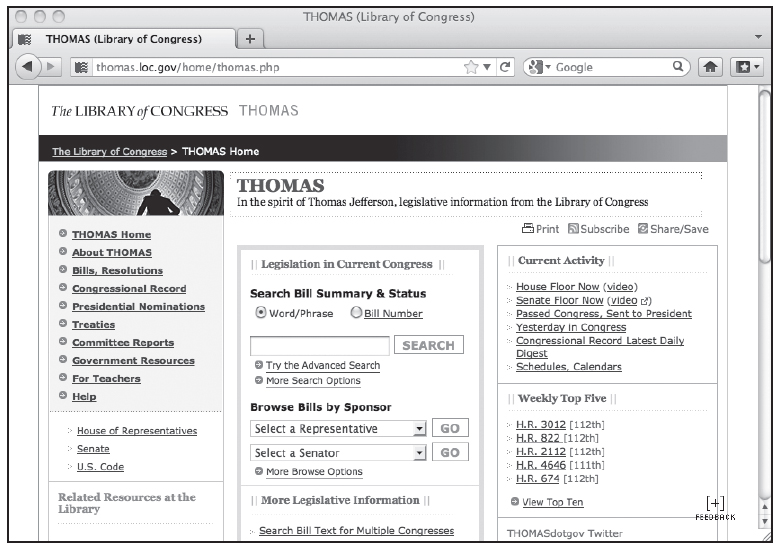Make the Most of Internet Search Tools
Printed Page 78
Your research efforts will be most effective if you understand the features of search engines and subject (Web) directories and know how to use them to locate what you need.
Distinguish among Types of Search Engines
Search engines use software robots (called “spiders” or “crawlers”) to index the contents of the Web, automatically scanning up to billions of documents that contain the keywords and phrases you command them to search. Then, using a set of rules unique to the engine, a software program ranks the results from most to least relevant, though criteria for relevance vary.
General search engines (such as Google and Yahoo!) compile their own databases of Web pages. Specialized search engines let you conduct narrower but deeper searches into a particular field. Examples include Google Scholar, which searches scholarly books and articles; THOMAS (thomas.loc.gov), a federal legislation search engine—see Figure 10.1; and Scirus.com, a scientific information search engine. To find a search engine geared specifically to your topic, type in the topic term with the keywords “search engine.” For example, a search for internships AND “search engine” will lead you to various specialized sites, including AfterCollege.com and Idealist.org.
Blogs can be an important source of information about unfolding events and new trends and ideas, and with well over one hundred million English-language blogs out there, blog-specific search engines can help you find what you need. Technorati lets you search all of its blogs for posts on your topic or only those blogs devoted entirely to the topic. Technorati also ranks the most influential blogs on a variety of topics. It assigns each blog an “authority score” from 1 to 1,000 based on variables such as linking behavior (how often the blog is referenced by other sites); blogs’ rankings rise and fall according to its authority score. Google Blog Search also searches by post and by blog; main results always link to most recent posts.

Consult Subject (Web) Directories
A subject (Web) directory (also called a “subject guide”) is a searchable catalog of Web sites organized by a human editor, into subject categories such as “Science,” “Reference,” or “Arts and Humanities.” Subject directories allow you to progressively narrow your searches. If your speech is on some aspect of baseball teams, for example, you would follow these links until you find what you want:
sports → baseball → amateur → leagues → teams
Two of the most reliable academic subject directories are ipl2 (www.ipl2.org) and Infomine (infomine.ucr.edu). Among popular directories, Yahoo! Directory is among the most comprehensive and trustworthy.
Use Search Engines and Subject Directories for Different Purposes
Search engines and subject directories are best used for somewhat different purposes. Subject directories are most useful for learning about and narrowing a general topic, such as photography. If you are looking for a list of reputable sites on the same subject, use an academic subject directory such as ipl2, or one provided by a library; these will be free of commercial interests.
Because search engines index so many documents and scan the full text rather than just the title, first few pages, or URL address, they will find information not listed in subject directories. Search engines are the tool of choice when you need to find emerging information that may not yet appear in a subject directory, as well as specific terms, facts, figures, or quotations that may be buried within documents.
Beware of Commercial Factors
When researching your topic outside of a library portal, be alert to unwanted commercial influences on your search results—specifically, whether a listing appears merely because an advertiser has paid to put it there.
Some engines and directories accept fees from companies in exchange for a guaranteed higher ranking within results (called paid placement). Others accept fees to include companies in the full index of possible results, without a guarantee of ranking (called paid inclusion).3 For tips on identifying paid listings, see the following checklist.
Checklist: Identifying Paid Listings in Search Results
![]() Look for a heading labeled “Sponsored Links” or “Sponsored Results” at the top, side, or bottom of the main page. This indicates a paid-placement listing.
Look for a heading labeled “Sponsored Links” or “Sponsored Results” at the top, side, or bottom of the main page. This indicates a paid-placement listing.
![]() Use multiple search engines and compare the results.
Use multiple search engines and compare the results.
![]() Click beyond the first page of your search results to find relevant sites.
Click beyond the first page of your search results to find relevant sites.
![]() Read the fine print on a search engine’s disclosure pages to find its policy on paid inclusion.
Read the fine print on a search engine’s disclosure pages to find its policy on paid inclusion.